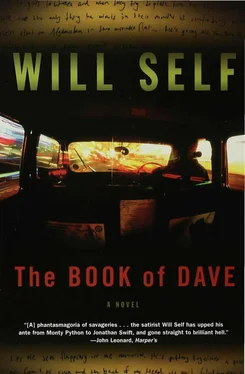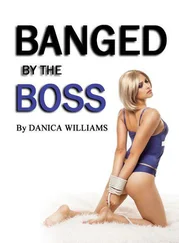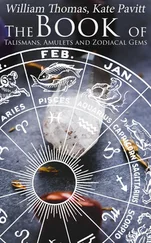
The air was crinkled up like cellophane by the exhaust fumes. It stank; he stank. He felt the ingrained lubricant of a thousand thousand fill-ups slide between his fingertips and the shaky rim of the wheel. His past was a mirage, glimpsed across the stained forecourt of time. Through the miserable slot of the Fairway's windscreen he could see the glistening skin of the Swiss Re Building, as like some monstrous penis it self-erected over the City. It already had a nickname — the Gherkin — but a proper cockney wouldn't ask for a gherkin and chips, he'd say wally … gissa wally.
As the cockney wally rose up, it dumbly forced new parallaxes on the earthbound toilers. Dave Rudman had never felt so imprisoned in the wobble boards of the cab's bodywork, so coiled in razor wire, so commanded to KEEP LEFT, GIVE WAY and STOP. The CCTV cameras angled across the box junctions; the traffic wardens like urban Watusi with hand-held computers for spears; the cops in their cars; the PCO in their concrete bunker — every square foot of London was accounted for, taxed and levied. He looked about him at the other cars in the jam. The drivers sat, mobile-phone hands clamped to their aching heads, suffering the neuralgia of ceaseless communication. The radio on the Fairway's dash muttered on: 'Lorry shed its load on the A3 Kingston Bypass. . stop-start traffic there … Lane out on the Marylebone Flyover …' Dave had become a cabbie to miss out on the supervisory eyes that made adult working life another fidgety classroom, yet here he was '… coming into junctions fifteen and sixteen on the Emtwenny5, that's the Emfaw and the Emfawty, lane and speed restrictions are in force …' with the worst guvnor of all — insecurity. Insecurity and the Flying Eye, its rotary eyelid blinking overhead.
Dave pulled into a side street and turned off the ignition. He got out his pills and began to pop the antidepressants out of their plastic blisters. He didn't stop until the gulches of his jeans were choked with little white boulders. Then he opened the door, picked up his change bag, got out and chinked away, scattering dumb Smarties as he went. He didn't look to see if he was parked on a yellow line; he didn't even bother to lock the cab. He didn't care. It was over — he'd grabbed the fat moment. He was free.
As he walked, Dave Rudman looked not up to the sky, nor around him at the brutal buildings, but at the ground, at the tarmac upon which his life had been rolled out. Tarmac blue-black and asphalt dimpled; tarmac folded and humped like a grey-brown blanket; tarmac cratered, bashed and gashed. This was the petrified skin he'd been feeling all his prostituted life, its texture transmitted through rubber tread and steel shock-absorber. Dave felt a compulsion to kneel down on the kerb and bow his head into the gutter — to lick the abrasive surface with his rough old tongue.

Dave licked between Phyllis's shoulder blades and drove his tongue down her grooved back. She shuddered and, grabbing his thigh, pulled it up and over her own so that he half straddled her. In the confusion of their bodies — his hairy shanks, her sweaty thighs, his bow-taut cock, her engorged basketry of cowl and lip — there was clear intent; so that when he penetrated her, they moved into and out of one another with fluid ease, revving and squealing, before arriving quite suddenly.
Dave and Phyl were having sex in her cottage outside Chipping Ongar. They'd had sex the previous evening after a healthy meal of cauliflower cheese. They had woken twice — perhaps three times — in the night to do it again, and now, with the larks crying over the fields outside, they were having sex once more. There was no billing or cooing between them — mouth chanced upon mouth infrequently. She pulled him into her spasmodically, her heels jamming on his hips. He felt the solidity of her — she wasn't blubbery but taut with fat. He plunged and rebounded. No words were spoken — yet neither doubted that they were making love, plenty of honeyed love to be stored for the future in their cells, should there come another time of scarcity when they needed replenishing.
In the late morning Dave walked into the little town to get the Sunday papers. Even in brisk March, with branches still bare, and rain showers moving across the Essex landscape like shading on a drawing, the gathering heat of summer was resounding through the land. He paused by the ancient moat of the long-since-levelled castle and lost himself in the subsurface bloom of duckweed. This would be a special day — they would not fret or worry. Towards evening they might walk across the fields to Good Easter, watching the returning flocks of swifts clench, then relax in the umber sky. The letters had been sent, the calls had been made, the reports had been written. At Phyllis's instigation Dave had taken matters into his own hands. Lawyers — they both agreed — would only sop up money and make things worse, like they always did. Better to make as direct an approach as possible and state — with clarity and humility — that if Carl was at all willing, and his mother would permit it, Dave would like to resume seeing his son.

Dave ranked up by the cop shop on Old Burlington Street and walked down towards the offices of Undercroft Mendel. Since coming off the antidepressants he still felt the elbow-jabs of reckless thoughts — but mostly he felt better. Much better. Even so, he couldn't judge whether his damp palms were a withdrawal symptom or a dread anticipation. The newspaper rattle of pigeons taking flight startled him — and he mounted the steps feeling dizzy, fists clenched in the pockets of his old tweed jacket.
There were no sugar-dusted shortbreads or gold-rimmed coffee cups. There was no propelling pencil or unctuous manner. Instead of tipping back in his chair, Mitchell Blair leaned forward, doodling nervily on a yellow legal pad in unadorned biro. 'The thing is, Mr Rudman … at the end of the day' — he picked out demotic phrases from a mental file he maintained for such occasions — 'it isn't down to the Lord Justice, CAFCASS or even the courts' — he glanced towards the reassuringly open door — 'whether or not you resume contact with, er, Carl.'
'With my son, you mean.' Despite the rehearsals he'd been through with Phyl and every internal restraint he'd imposed upon himself, Dave was already warming up.
'Well, that's precisely the issue.' At this, Blair, losing all professional detachment, ducked down behind a barricade of heavy volumes. 'Ms Brodie has raised the matter of Carl's paternity. To be blunt, she doesn't believe that you are his biological father.'
Dave shook his head slowly — a great lummox pole-axed by a low blow. He felt uncomprehending and untidy. He groped automatically for a cigarette, although, even while so doing, he was appalled to hear his voice going on without him: 'Whaddya mean?'
'I mean — that is to say, I can state with some certainty' — Blair was recovering his sang froid, his fiddly features reappeared from behind the leather shield — 'that it has been established that Carl's biological father is, in fact, Mr Devenish.'
'Cal Devenish?' Dave kept on shaking his head. 'But that's impossible — how? When?'
'Mr Rudman.' Blair was now fully composed. He lay back in his chair, the sole of his loafer cleaner than Dave's shirt. The gold propelling pencil was out, the toothy timpani began. 'Ms Brodie had no intent to deceive you — both she and Mr Devenish understood that he was … well, he had had a vasectomy. However, these, ah, things can happen. Very rarely — but they do happen. Your ex-wife thought you would be upset, she understands that she owes you a full explanation. Were it not for your er' — he paused, smiling faintly — 'behaviour in the past, she would've been present for this meeting. Instead, she has given me this letter for you' — he placed it on his blotter — 'and should you — quite reasonably — require verification, your own nominated doctor can take both your blood and the boy's. Arrangements can be made for these DNA samples to be independently tested …'
Читать дальше













